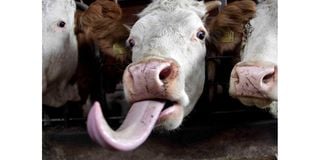Why some cows keep rolling their tongues

A dairy cow sticks out its tongue in a cowshed. Low body score attributed to cows spending a lot of time rolling tongue instead of feeding.
The farmer called saying she feared one cows could be having rabies. She was in panic, lamenting that she knew rabies is not curable.
I appealed to the caller to calm down and give an account of what she had observed, when it had started and whether there had been any events on the farm that could have predisposed her cattle to rabies.
Situations that could expose cattle to the illness include the sighting of a rabid or peculiarly-behaving dog or animal of the cat or dog family, previous diagnosis of rabies on the farm in livestock, wandering of the cattle into unknown areas or an outbreak in the area.
Cessy, the caller, responded negatively to the circumstances that could infect her cattle with rabies. She said the cow had been developing the peculiar behaviour over one week. It started by extruding the tongue and then folding it backwards and inserting it into the nostrils. I made note that the action was normal unless done frequently.
The cow was a three-year-old Jersey that had calved down twice. It rolled the tongue out of the mouth, appeared to swallow it before throwing it out again.
Initially, it would take the actions slowly but the speed increased with time. The cow would move the tongue fast and discharge a lot of saliva at times. Cessy said the salivation was one of the reasons she thought the cow had rabies.
I asked if the animal was eating and drinking water. When she responded in the affirmative, I said it could not be rabies. Rabid animals get paralysis of the swallowing muscles.
Further, the cow had had the condition for two weeks without any deterioration of its calm and friendly behaviour. Rabies cases get aggressive or quiet, become weak, lose their voice and finally cannot walk. They die within 10 days from the onset of the signs.
Cessy’s zero-grazing cows were given chopped feed. I asked her to send me a video of the cow “exercising” its tongue. The clip clearly showed what she had described.
The animal had bovine rolling tongue orosthenic syndrome (BRTOS). She said doctors have the habit of coining long complicated terms to scare patients.
Most medical terms sound complicated because they were derived from Latin and Greek and names of people who described organs, diseases and disease-causing micro-organisms.
Borborygmus, for example, is the sound of the stomach growling due to movement of gas. It is from the Greek word borboryzein, which means rumbling.
I explained BRTOS to Cessy and how she would manage it. It is not a disease. Cattle with the problem have been found to have normal body health indicators except those related with reduced feeding time. Two studies in 2022 showed that cows with BRTOS had poorer body condition than those with normal behaviour.
The low body score was due to the cows spending a lot of time rolling the tongue instead of feeding. Cows with BRTOS tend to drink more water than the rest due to dehydration caused by saliva loss.
The cow drools due to the rapid tongue movements and evaporation from the tongue surface.
Because of the high intake of water, BRTOS cattle were found to yield more milk than those without the condition.
The studies further showed the behaviour was common in cattle that had little space to walk about and were fed on finely chopped fodder or with very low fibre content. The animals were thought to have been making motions similar to apprehending plant material.
It has also been found that Jersey cows and Jersey crosses have a higher tendency to develop BRTOS than other breeds. The condition can therefore be genetic. It is advisable not to breed the offspring of cattle with BRTOS.
The behaviour has been attributed to boredom when cattle are confined, consumption of a low fibre and genetics.
Affected cows can be discouraged to stop the behaviour if they are provided with sufficient walking space, high fibre diet or less chopped fodder. Salt lick blocks can also distract the animals.
In my long practice of veterinary medicine, this was my fifth case of BRTOS. The cases involved Jerseys or their mixes. If you have encountered BRTOS, please let me know how many cases you have seen, in which breeds and how they were resolved.
jmugachia@yahoo.com





